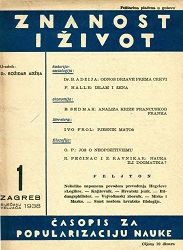
We kindly inform you that, as long as the subject affiliation of our 300.000+ articles is in progress, you might get unsufficient or no results on your third level or second level search. In this case, please broaden your search criteria.

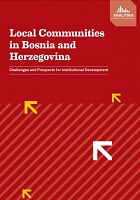
Local communities (mjesne zajednice – hereafter LCs) in Bosnia and Herzegovina (hereafter BiH) have for a long time been perceived as a relic of the country’s Yugoslav past. The sub-municipal institutions were established in former Yugoslavia as hubs of community self-government, serving as venues of citizen engagement around community problems. However, after the former socialist political system was dismantled following the 1992-1995 war and new institutions were installed, not much attention had been paid to local communities. As of recently, LCs have been receiving increasing attention, especially of international and non-governmental organizations. As legally recognized sub-municipal institutions, they are seen as having potential to foster citizen engagement. A 2012 survey of Centres for Civic Initiatives (CCI), administered in 14 municipalities in BiH, shows that respondents were the most aware of the possibility to participate through the LC (74.6%) out of a number of other participation mechanisms at the local level, and that the LC is among the most frequently used participatory mechanisms (33.2%). Although a 2009 World Bank study survey data from 20 municipalities showed that most citizens did not have the experience of engagement in their community activities, of those respondents who did, 81% described LC council meetings as the most useful activity of participation. Thus, it is not surprising that a number of projects to date, implemented by different organizations, have focused on strengthening LCs. Some initiatives have pushed for a change of their legal status and have advocated for a minimum of standards for local community operations through local acts, while others have worked on strengthening local community capacities. However, a number of obstacles to local community functioning remain. Some authors highlight as challenges, inter alia, the lack of formal competences of these bodies, their missing financial autonomy and inconsistent budgetary allocations from local government to LCs, as well as the influence of political parties on the elections of LC councilors and presidents. The World Bank study shows vast differences in local respondents’ awareness of, and participation in their respective LC activities between different municipalities, signaling that, depending on the locality, LCs may be more or less active, and may take on different roles. A 2013 study of communal services in the city of Sarajevo showcases both the potential of urban LCs to serve as a link between government and residents and the discontent with LCs that residents expressed, stemming from a perceived lack of LCs’ efficiency and inability to help citizens relay their problems to higher levels of government. Understanding the functioning of LCs in BiH, as well as the context in which these institutions operate, is challenged by a lack of comprehensive research on the subject. Studies on local communities in BiH to date have offered only a partial glimpse into the different aspects of LC operations in practice. No baseline information has been collected, including reliable data on the number of LCs. There have generally been no official data or estimates published on the number of LCs in BiH, and such data are not collected by the statistical offices. In general, empirical studies on the subject are few, with most analyses to date focusing on the legal framework regulating LC work. The research presented in this study was conducted in order to systematically learn about the countrywide practices of LCs in BiH, and to offer broad recommendations for improving local community work in BiH. Given the lack of baseline information on their functioning, it is difficult to analyze the work of LCs in BiH and to hypothesize in a meaningful way what contextual factors may be influencing their work. Provided these difficulties, the research is largely exploratory, seeking to gather insights and create descriptive accounts of the operations and functions of LCs. The report is structured as follows: The next, second, chapter features an overview of concepts related to sub-municipal and neighborhood-level governance, followed by a chapter on comparative practices of LCs in the countries of former Yugoslavia. In the fourth and fifth chapters, the analytical framework and research design are laid out. In chapter 6, research results are presented, structured according to key aspects of local community functioning. A conclusion and recommendations follow.
More...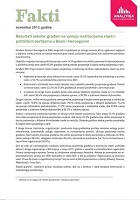
Građani Bosne i Hercegovine (BiH) mogu biti razjedinjeni po mnogo osnova, ali su uglavnom saglasni u jednom: velika većina ne vjeruje institucijama vlasti, političkim partijama niti izabranim političkim zvaničnicima. Ubjedljivo najlošije kotiraju političke partije: samo 14,1% građana ima veliko povjerenje ili dosta povjerenja u političke partije dok cijelih 83,9% građana nema previše povjerenja ili uopće nema povjerenja u njih.
More...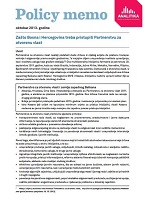
Open Government Partnership (OGP) aims to encourage governments worldwide to become more transparent and more accountable to their citizens, “with the ultimate goal of improving the quality of governance, as well as the quality of services that citizens receive.” This multilateral initiative was formally started on September 20, 2011, when the governments of Brazil, Indonesia, South Africa, Mexico, Norway, the Philippines, United States of America and United Kingdom endorsed the Open Government Declaration. Meanwhile, the number of states participating in the initiative grew to 60, including all the Western Balkans countries apart from Bosnia and Herzegovina (BiH) and Kosovo. The initiative is overseen by a Steering Committee, which is comprised of government and civil society representatives.
More...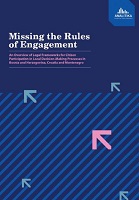
Citizen participation in local level decision-making processes is not a novelty in the region of former Yugoslavia. The subject had received international attention during the 1970s, when innovative participatory institutions and practices in Yugoslav municipalities were making their way into scholarly texts discussing solutions to the problems of participatory democracy. Yet despite – or maybe because of – the apparent historical legacy of citizen participation in local-level decision-making, current accounts of local-level practices of citizen engagement appear to be wanting. Research conducted in Bosnia and Herzegovina (hereafter: BiH), Croatia and Montenegro, three countries considered in this report, points to weaknesses in the way participatory processes are conducted. Despite variations in practice, the general impression is that citizens are inadequately informed about possibilities for participation and may lack feedback on outcomes of participatory processes; that their ability to influence decision-making is perceived to be questionable; or that local administrations lack capacities and expertise for organizing well-structured participatory events. The motivation of citizens to engage in decision-making appears to be hampered by their perception that chances to do so are limited and that official channels for addressing their problems and needs are absent. Such findings are especially telling considering that citizen participation has become a key word in the jargon of national and local governments, as well as international organizations that have in the past twenty years devoted significant efforts to policy development and capacity building processes in the area of citizen engagement. To date, little attention has been paid to the factors that potentially influence participatory processes and that may help explain the similarities and differences in practice in these three countries since their democratization. Considering an enabling policy environment to be such a factor, this report seeks to inquire whether legal and institutional frameworks for citizen participation in BiH, Croatia, and Montenegro enable or discourage citizen participation in decision-making in local affairs. This factor appears especially important given the substantial effort vested in participation policies and programs by domestic and international actors. At the same time, we recognize the importance of other contextual factors for effective participation, such as the level of democratization, tradition of citizen engagement or the capacities of different actors to encourage participatory practices, but do not examine them at any length in here. This report is a result of research conducted for the project “Effective and sustainable citizen participation” in order to inform the creation of operational documents for citizen participation in local decision-making processes in BiH, Croatia and Montenegro. The ultimate purpose of the report is to provide a systematic overview of legal arrangements for citizen participation in the three countries, so that operational documents could be drafted in such a way as to correspond with the existing legal and institutional frameworks. Besides the needs of the project, the comparison of these three countries is also conceptually and methodologically motivating because they recently were a part of the same legal, political and cultural whole in the joint administrative organization of the former Yugoslavia, but have in the past twenty years had different reform paths, as suggested by their different EU accession prospects. These differences and similarities between countries form an interesting basis for analysis of legal and institutional frameworks for citizen participation, especially having in mind the rather bleak findings on citizen participation in practice. Furthermore, an almost total absence of comparative studies on legal frameworks and institutional practices with respect to citizen participation at the local level in the three countries is an additional reason for providing an overview such as this one. Although its theoretical and explanatory value might be limited by a primarily descriptive approach and methodological limitations (see below, Chapters 2 and 3), this report attempts to offer a sound systematic basis for further studies on this largely neglected topic in the region of Western Balkans. In that respect, the ambition of this text is to provide a broad overview of key characteristics, trends and processes in respect to the evolving legal frameworks and institutional practices for citizen participation in BiH, Croatia and Montenegro, and to point out key issues and questions, rather than to offer explanations and answers. Special emphasis will be placed on correspondence between legal frameworks in the three countries on one side, and relevant international norms and standards, notably those of the Council of Europe, on the other. This report begins with a conceptual framework of citizen participation in Chapter 2, followed by the analytical approach and methodology in Chapter 3. Chapter 4 provides an overview of local governance and a synthesis of results on citizen participation in practice in these three countries to date, and Chapter 5 contains an analysis of the enabling and disabling aspects of the institutional and legal frameworks for citizen participation. The findings of this overview are discussed in the concluding Chapter 6, with recommendations for the institutionalization of local-level citizen participation processes and with suggestions for further inquiry.
More...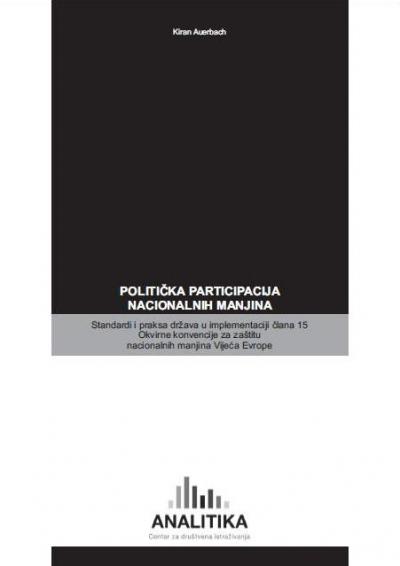
U evropskom kontekstu, najvažniji ugovor koji se bavi pravima manjina je Okvirna konvencija za zaštitu nacionalnih manjina (Framework Convention for the Protection of National Minorities) (u daljnjem tekstu: Okvirna konvencija ili FCNM) Vijeća Evrope iz 1998. godine, koju je usvojilo više od 40 država članica širom kontinenta. Okvirna konvencija se u članu 15. bavi pitanjem participacije nacionalnih manjina u javnim poslovima, ali je sam tekst neodređen i nudi premalo pojašnjenja za praktičnu implementaciju. Kao odgovor na sve veće priznanje participacije u javnim poslovima kao važnog aspekta prava manjina, stručno tijelo koje prati implementaciju Konvencije – Savjetodavni odbor za Okvirnu konvenciju za zaštitu nacionalnih manjina (u daljnjem tekstu: Savjetodavni odbor ili SO) – 2008. godine je objavio detaljan Komentar o efikasnoj participaciji pripadnika nacionalnih manjina u kulturnom, društvenom i ekonomskom životu i javnim poslovima (Commentary on the Effective Participation of Persons Belonging to National Minorities in Cultural, Social and Economic Life and in Public Affairs), koji nudi tumačenje osnovnih standarda za provedbu člana 15. i predstavlja odraz izvještaja koje podnose države. Nema sumnje da je Savjetodavni odbor dao veliki doprinos podizanju svijesti o participaciji manjina u odlučivanju i uspostavljanju standarda u ovoj oblasti. U ovom izvještaju analizira se njegov Komentar, kao i najaktuelniji ciklusi podnošenja izvještaja svake države članice Okvirne konvencije, kako bi se pojasnilo značenje efikasne participacije u odlučivanju i kako bi se identifikovali modeli najbolje prakse. Kao okvir koji obuhvata institucionalne mehanizme participacije i zajednička pitanja koja treba uzeti u obzir prilikom njihovog oblikovanja, ovaj izvještaj posvećuje pažnju koordinaciji među mehanizmima, te koordinaciji na različitim nivoima vlasti, uključujući lokalni nivo, koji je često zanemaren u stručnim analizama. Pored ove opće svrhe, poseban je cilj izvještaja da posluži za pojašnjenje, promoviranje i pružanje smjernica u implementaciji vladavine koja uključuje nacionalne manjine u Bosni i Hercegovini i drugim zemljama Balkana. Ova druga dimenzija izvještaja rezultat je često primijećenog nerazumijevanja koncepta političke participacije manjina, te često neizvjesnih i kompliciranih puteva ka istinski multietničkoj vlasti kojima ove zemlje, u različitoj mjeri, trenutno idu. U analizi se također uvažavaju dva postojeća faktora koja utječu na rad Savjetodavnog odbora u postavljanju standarda i u ocjenjivanju prakse država. Prvi je široka sloboda procjene koja se daje državama u oblikovanju sistema političke participacije manjina, kao i individualizirani pristup Savjetodavnog odbora, koji uzima u obzir specifične kontekste različitih država (kao što su trenutni nivo uključenosti manjina, historijski i društveno-politički faktori) prilikom ocjenjivanja ovih sistema. Drugi je faktor ograničeni mandat Savjetodavnog odbora, jer o dnevnom redu u proceduri podnošenja izvještaja u najvećoj mjeri odlučuju same države potpisnice, a SO se oslanja na saradnju država i ne posjeduje mehanizam provedbe kojim bi osigurao ispunjavanje svojih preporuka. Ova studija, dakle, istražuje i utjecaj tih faktora na postavljanje standarda i na pojedinačna mišljenja SO-a o implementaciji političke participacije manjina koju provode države potpisnice. Ona nudi slikovite primjere iz postupka podnošenja izvještaja samih država kako bi se istaknuli i dodatno pojasnili relevantni standardi. Međutim, analiza također ima za cilj da reducira dio optimizma prema radu SO-a u svjetlu primjetnih nedostataka, na koje dijelom utječu i postojeća ograničenja njegovog mandata. Nakon uvodnog dijela, u prvom poglavlju se ispituju kriteriji koje države obično koriste za priznavanje postojanja nacionalnih manjina prema domaćim zakonima i porede se sa uputama SO-a. Sam termin „nacionalna manjina” pravi je primjer slobode tumačenja u pojedinim zemljama, jer u Konvenciji ne postoji zajednička, općeprihvaćena definicija. Uprkos ovom slobodnom prostoru, SO predviđa osnovne principe kojih države članice treba da se pridržavaju a koji se odnose na zauzimanje inkluzivnog i fleksibilnog pristupa u dodjeljivanju statusa nacionalne manjine. SO smatra neopravdanim proizvoljno isključenje ili razlikovanje grupa na osnovu njihovog dugotrajnog prisustva u zemlji, teritorijalnih veza sa geografskim područjem i brojčane zastupljenosti. Ono što je važno jeste da Odbor insistira i na tome da državljanstvo ne treba predstavljati osnov za isključivanje osoba koje pripadaju nacionalnim manjinama (mada su malobrojne države koje su usvojile ovaj princip), jer mnogi dijelovi Konvencije, uključujući član 15, ne zahtijevaju dimenziju državljanstva. SO je naročito odlučan u tome da državljanstvo ne treba predstavljati uslov za glasanje ili kandidiranje na izborima na lokalnom i regionalnom nivou. Nalazi ove sekcije imaju odjeka i u narednim poglavljima izvještaja, jer je zvanično priznanje nacionalnih manjina direktno povezano sa dodjeljivanjem posebnih participatornih prava rezerviranih za pripadnike nacionalnih manjina. U narednom poglavlju analizira se trodijelna institucionalna struktura participacije nacionalnih manjina u političkim aktivnostima. Ona obuhvata predstavljanje u kontekstu izabranih funkcija, kao što su one u parlamentima i lokalnim vijećima, konsultativna ili savjetodavna tijela, te zapošljavanje u javnoj upravi. Predstavljanje u kontekstu izabranih tijela i pozicija obično je najdirektniji način na koji predstavnici manjina aktivno učestvuju u odlučivanju. Među ključnim mjerama koje se mogu koristiti za povećanje prisustva pripadnika nacionalnih manjina u izabranim tijelima jesu: dozvola djelovanja političkih stranaka manjina, oblik izbora sa odvojenim glasačkim listama, izuzeća od izbornog praga, kvote i rezervirana mjesta, te posebna prava kao što je pravo manjinskog veta. Konsultativna tijela još su jedan institucionalni mehanizam i služe kao mjesto gdje predstavnici manjina mogu učestvovati u međusobnom dijalogu kao i u dijalogu sa organima vlasti. Ova tijela imaju savjetodavnu funkciju i mogu predlagati i dopunjavati zakone koji se tiču nacionalnih manjina. Zaposlenje u javnoj upravi još je jedan način uključivanja manjina u javne poslove, a angažiranje nacionalnih manjina u tom segmentu ima veliki utjecaj na podizanje opće svijesti o manjinama u državi i kod većinskog i kod manjinskog stanovništva, kao i na ulijevanje povjerenja u institucije vlasti kod pripadnika nacionalnih manjina. Osim ova tri osnovna mehanizma, SO poziva specijalizirane organe izvršnih vlasti, kao što su ministarstva i odjeli za prava manjina, da koordiniraju, prate i uključuju manjinska pitanja na svim nivoima vlasti. Specijalizirani organi vlasti imaju zadatak da koordiniraju državnu politiku prema nacionalnim manjinama i zaduženi su za praćenje implementacije i rezultata, kao i za povezivanje sa predstavnicima manjina, manjinskim organizacijama, te odgovarajućim tijelima u kojima učestvuju manjine u cilju olakšavanja komunikacije. U ovom smislu, specijalizirani organi vlasti uključuju manjinska pitanja u cjelokupni institucionalni okvir i državni aparat. I na kraju, decentralizirani oblici vlasti, kao što su regionalna autonomija i samouprava, mogu predstavljati korisno sredstvo da se nacionalnim manjinama omogući kontrola nad njihovim interesima, naročito na lokalnom i regionalnom nivou. Drugi dio drugog poglavlja bavi se zajedničkim pitanjima koja se tiču efikasnosti institucionalnih mehanizama. Tu se ubrajaju legitimitet i pluralizam predstavnika nacionalnih manjina i ostalih sagovornika (kao što su relevantni predstavnici nevladinih organizacija, istraživači i drugi stručnjaci) da zastupaju pripadnike nacionalnih manjina; raspon tema pored kulture, obrazovanja i jezika u pogledu kojih predstavnici mogu učestvovati u odlučivanju, uključujući i raspodjelu budžeta; njihov utjecaj i glas u odlučivanju, pri čemu se naglašava značaj suštinske participacije, za razliku od pukog prisustva u organima vlasti; kao i uključivanje pitanja koja se tiču manjina u državnu politiku i institucije vlasti. Ova pitanja predstavljaju suštinske standarde participacije i moraju se uključiti u strukturu institucionalnog okvira kako bi se osiguralo da mehanizmi participacije omoguće pripadnicima nacionalnih manjina pravo da učestvuju u odlučivanju. Ovi standardi se zatim ispituju u trećem poglavlju, gdje se procjenjuje dosljednost djelovanja Savjetodavnog odbora. Među značajnijim prazninama u njegovom radu je nedovoljna povezanost direktnih kritika i dosta apstraktnih preporuka koje SO nudi u svojim mišljenjima. U trećem poglavlju se povezuju dva ranije spomenuta faktora – sloboda procjene i individualizirani pristup; ograničeni mandat i reaktivni pristup – da bi se objasnio dio ovih nedosljednosti. Istražuju se i drugi primijećeni propusti, kao što su: jednake kritike prema državama koje imaju različitu praksu; nedosljednosti i blagost; predlaganje alternativnih metoda koordinacije i uključivanja politika prema manjinama u pojedinim državama, a koje se razlikuju od uputa iz Komentara samog Savjetodavnog odbora; te nedosljednosti u reagiranju Odbora na izbor mehanizama participacije kada država članica iskazuje neujednačen razvoj tri vrste participatornih kanala ili njihov neujednačen razvoj na različitim nivoima vlasti.
More...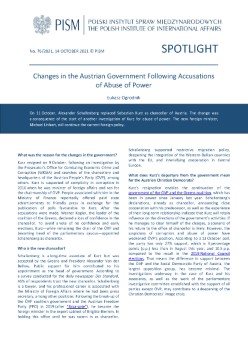
On 11 October, Alexander Schallenberg replaced Sebastian Kurz as chancellor of Austria. The change was a consequence of the start of another investigation of Kurz for abuse of power. The new foreign minister, Michael Linhart, will continue the current foreign policy.
More...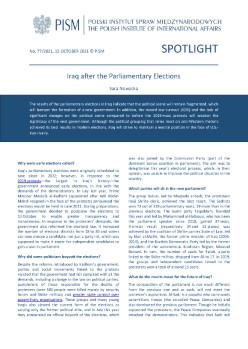
The results of the parliamentary elections in Iraq indicate that the political scene will remain fragmented, which will hamper the formation of a new government. In addition, the record low turnout (41%) and the lack of significant changes on the political scene compared to before the 2019 mass protests will weaken the legitimacy of the next government. Although the political grouping that relies most on anti-Western rhetoric achieved its best results in modern elections, Iraq will strive to maintain a neutral position in the face of U.S.- Iran rivalry.
More...
On 15 February, the member states of the World Trade Organisation (WTO) elected Ngozi OkonjoIweala as Director-General of the organisation. She is the first woman and first African in this position. She will focus on fighting the COVID-19 pandemic, reforming the WTO, and mitigating the effects of the U.S.-China rivalry. Her election likely increases the importance of the interests of the least-developed members of the organisation, which may lead to a revival of talks that are sensitive to the EU, for example, concerning agriculture.
More...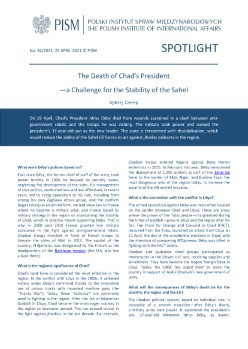
On 19 April, Chad’s President Idriss Déby died from wounds sustained in a clash between antigovernment rebels and the troops he was visiting. The military took power and named the president’s 37-year-old son as the new leader. The state is threatened with destabilisation, which would reduce the ability of the Sahel G5 forces to act against jihadist militants in the region.
More...
The pro-government coalition’s win in the elections to the National Assembly (AN) held on 6 December means Nicolás Maduro will resume full control of state institutions. The EU, the U.S., and other countries that recognise Juan Guaidó as interim president are questioning the legitimacy of the elections and will intensify Venezuela’s international isolation. In response, the Maduro government will be enhancing cooperation with Russia and China, among others. Consequently, the option to resolve the political conflict in Venezuela through negotiations between the government and opposition, as promoted by the EU, will drift away.
More...
Election Day in the U.S. is over but the ballot counting continues. The winner of the presidential election and official results may only be known in a few days. However, Donald Trump on election night declared himself the winner and said he would have lawyers arguing at the Supreme Court to suspend the counting of remaining votes to maintain his advantage in some states.
More...
On 30 June, the Standing Committee of the Chinese National People’s Congress adopted the Hong Kong National Security Law, and Chairman Xi Jinping signed it. It entered into force on 1 July. In selected cases, it violates Hong Kong’s jurisdictional independence under the “one state, two systems” principle reflected in the legally binding Sino-British Joint Declaration of 1984 regarding the transfer of the region to China.
More...
President Donald Trump announced on 29 May that the United States is withdrawing from the World Health Organization (WHO). Although he said this decision was based on supposed Chinese control of the WHO and the body’s refusal to undertake reforms demanded by the U.S., the reason also could be his aim to divert American public attention from his administration’s negligence in the fight against COVID-19. The U.S. must let a year lapse between notification and withdrawal and pay any outstanding contributions before it fully exits. From Poland’s perspective, the U.S. leaving the WHO is unfavourable because it reduces the chances of broader reform of the body.
More...
President Moon Jae-in’s Democratic Party won the parliamentary elections held on 15 April in South Korea, winning 60% of the seats. The election results and the highest turnout in 28 years (66%) resulted from the positive social assessment of the authorities’ actions to stem the COVID-19 pandemic and the efficient organisation of the elections in difficult conditions. The ruling party’s win will provide a boost to Moon’s reform policy drive until the end of his term in 2022.
More...
President Tsai Ing-wen from the Democratic Progressive Party (DPP), which opposes mainland policy, won re-election and secured a majority in the legislature in the presidential and parliamentary elections in Taiwan on 11 January. The results mean failure of the PRC’s policy towards Taiwan, signal a decrease in Taiwan's dependence on mainland China, and dismissal of the prospect of reunification under China’s “one country, two systems” principle.
More...
The Knesset elections held on 17 September did not reveal a clear winner, as none of the blocs formed around the largest parties - Likud and Blue and White - won a parliamentary majority. The parties’ readiness for compromise over the idea of a national unity government or internal splits may prove to be key in the formation of the future coalition.
More...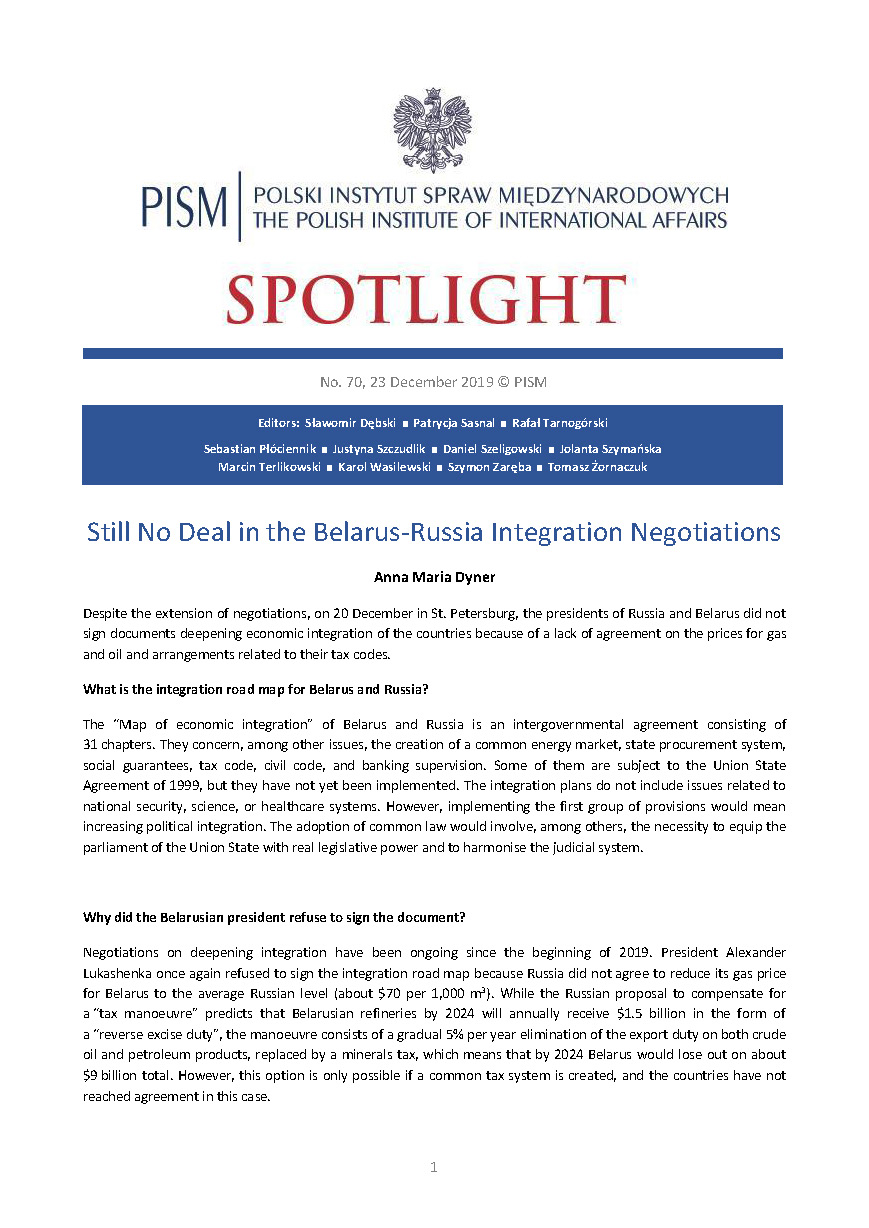
Despite the extension of negotiations, on 20 December in St. Petersburg, the presidents of Russia and Belarus did not sign documents deepening economic integration of the countries because of a lack of agreement on the prices for gas and oil and arrangements related to their tax codes.
More...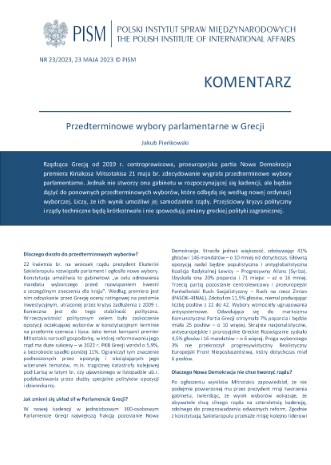
Rządząca Grecją od 2019 r. centroprawicowa, proeuropejska partia Nowa Demokracja premiera Kiriakosa Mitsotakisa 21 maja br. zdecydowanie wygrała przedterminowe wybory parlamentarne. Jednak nie stworzy ona gabinetu w rozpoczynającej się kadencji, ale będzie dążyć do ponownych przedterminowych wyborów, które odbędą się według nowej ordynacji wyborczej. Liczy, że ich wynik umożliwi jej samodzielne rządy. Przejściowy kryzys polityczny i rządy techniczne będą krótkotrwałe i nie spowodują zmiany greckiej polityki zagranicznej.
More...